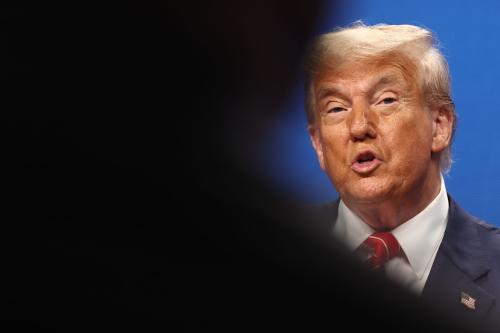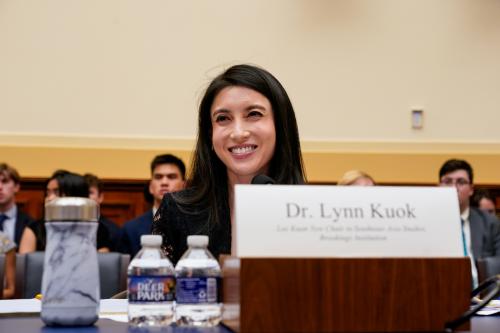From July 22 to August 1, United States Secretary of State Colin Powell will make his first official visit to East Asia in his new job, first stopping in Tokyo, and then traveling to Hanoi, Seoul, Beijing and closing his regional tour in Canberra. The Secretary has a full agenda cover on this trip, both consultative and contentious, and will help set the stage for President Bush’s planned visit to the region in mid-October. Powell travels at a sensitive time in the region across a range of key issues, and the diplomat’s skills will be sorely tested even among allies. But at the same time, it will provide important players in the region the chance to influence American thinking early in the new Adminstration.
In Tokyo, Secretary Powell will seek to further strengthen his Administrations commitment to bolstering the U.S.-Japan alliance. Following up on his counterpart’s trip to Washington a month ago, Powell will maintain the message of solidarity with the new Japanese Prime Minister Koizumi and his Foreign Minister, Ms. Tanaka. Reform and revitalization of the Japanese economy will likely top Powell’s talking points as Washington is increasingly nervous about its ally’s persistent economic woes. But the Secretary will also arrive at a time when U.S. troop presence in Japan is once again hotly debated in the wake of the arrest and detention of a U.S. serviceman accused of rape in Okinawa. The trick will be to reassure Japanese counterparts of American sensitivities to Japanese concerns, while at the same time making real progress in placing the political, economic and military climate between the two countries on a firmer footing.
The centerpiece of the trip will be Powell’s attendance at the ASEAN Regional Forum and the ASEAN Post-Ministerial meetings in Hanoi from July 24 to 26. The meeting in Vietnam will mark another big step in that country’s steady political rehabilitation and reintegration into the region. It will be particularly poignant for Powell, whose formative years in the military unfolded during America’s drawn out war with Vietnam in the 1960s and early 1970s, and whose lessons still shape the Secretary’s thinking on military affairs. The ARF meeting itself will likely yield little of substance, and the U.S. side has low expectations. But the meeting offers an excellent opportunity for senior diplomatic leaders from around the region to hold sidebar conversations and more official consultations as well. Among the most interesting possibilities would be for Powell to meet even briefly with his counterpart from Pyongyang (North Korea joined the ARF in 2000).
From Hanoi, the Secretary will journey to Seoul for a day of consultations. The recently completed North Korea policy review in Washington will dominate discussions there as the United States and South Korea seek to realign and reconcile their respective positions. A strong joint statement in support of renewed North-South dialogue and engagement might entice Pyongyang to come out of its shell, but the North appears unwilling to move ahead until it fully understands—and less likely, accepts—what the new U.S. Administration expects from it.
The toughest stop on the trip may well be in Beijing—but maybe not. U.S.-China relations on are one of their periodic upswings, with Beijing eager to see improved ties. With Beijing winning its bid to host the 2008 Olympics, with WTO accession coming soon, and with the U.S. President going to Beijing for a summit meeting in October, the Chinese leadership will be brimming with confidence. However, it is not clear how far the U.S. Adminstration is prepared to go to return the favorable treatment. Suspicions of China still run high in Washington, and in the end, China is likely to be disappointed with the Bush team approach. Still, given the rocky start for U.S.-China relations this year, the Secretary’s visit will do much to put the relationship on a more stable setting.
Rounding out the trip, Secretary Powell will join U.S. Defense Secretary Donald Rumsfeld in Canberra for the annual Australia-U.S. ministerial consultations on July 30. A part of the Secretary’s job will be to counter emergent views in Australia which question the salience of the country’s alliance with the U.S., terming it outdated in the post-Cold War world. To do so, the meetings in Australia should explore new ways for the alliance to implement regional and multilateral security arrangements, keep abreast of troubling developments in Indonesia, and work together to reinvigorate the free trade agenda of the Asia Pacific Economic Cooperation (APEC) group.
East Asians will watch the Secretary’s visit carefully to glean signs of a more engaged and less unilateral American approach in the Asia-Pacific region. Powell is certainly sensitive to these concerns, and is in a good position for a mostly successful visit. As Washington appears poised to give more and more attention to political, economic and security developments in East Asia, this visit will be an excellent opportunity for leaders in the region to shape that focus at an early stage.
The Brookings Institution is committed to quality, independence, and impact.
We are supported by a diverse array of funders. In line with our values and policies, each Brookings publication represents the sole views of its author(s).



Commentary
Op-edPowell’s Asia Visit: A Chance to Shape American Thinking Toward the Region
July 25, 2001